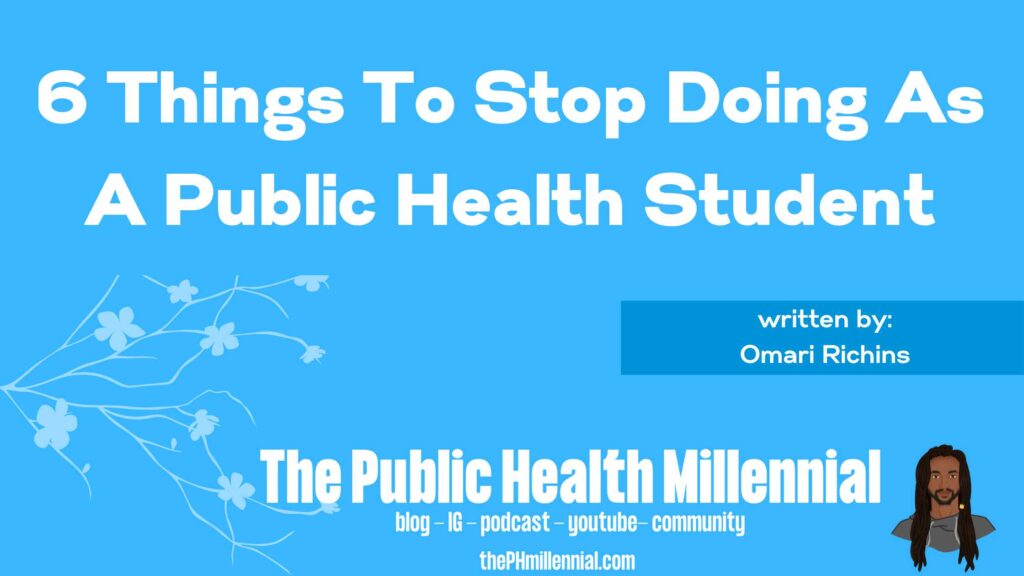Here are 6 things to stop doing as a public health student.
From the nature of The Public Health Millennial platform, I chat and talk with many public health students as well as just observe on online platforms. I’ve realized that many students tend to operate very similarly.
I’m sharing my thoughts in the hopes of helping someone along their journey. If you’re able to better to stop doing these 6 things as a public health student, you’ll see yourself going just that much further.
As I’ve stated before, the public health field is becoming more competitive and thus you need to take steps to do more than average.
Support The Public Health Millennial on BuyMeACoffee
1. Waiting On Others
Don’t wait for others to bring opportunities to you. Go and get those opportunities yourself.
I’ve seen too many LinkedIn post where public health people have just graduated or are about to graduate and are asking for someone to help them get a job.
Correct me if I’m wrong, but isn’t the reason you’re in school to get a job afterwards? Don’t wait so late to ask for help. Don’t expect anyone to send you any opportunities if you haven’t put in work yourself. You should be proactively searching for jobs way before you graduate.
Additionally, there are so many opportunities that are going on around you. This is especially true, as many opportunities have had a remote potential due to the pandemic. There are opportunities all around, they don’t wait for those that are not being proactive. As public health gets more competitive, go out of your way to find the opportunities to make you a more all-rounded future professional.
(Related: Career Chat With The Public Health Millennial)
2. Not Speaking Up Enough
Your voice as a public health student is important. Your perspective is valued and we need you to speak up more in all spaces.
I wish I took my words here more seriously when starting my public health career (internships, volunteering and jobs). You are in a place where you are gaining knowledge combined with your personal life experiences. Your views and perspectives are important. Though you might not know or feel it, you have insights that we all want to hear.
Speak up in class, speak up in meetings, speak up when you can, and find ways to speak up when you can’t.
In public health, you are going to have to speak up for the things that you are important to you. Many communities don’t have a voice to speak up and that’s why you must use yours until we can get them all to the tables.
Our voices, our stories, our thoughts are important and valued – try to share more of it with the world. If it is one thing, a conversation could spark a big change in the world.
3. Not Asking For Help Early Enough
If you need help, if you think you need help – BLOODY ask for the help! Ask for the help you need as soon as you think you do.
During school is no time to be bashful. Time is of the essence and help is best asked for earlier than later. We don’t know everything and that’s alright. We have to figure that out for ourselves. Ego may prevent you from seeking out help, but don’t let it.
Asking for help is fundamental in learning and in life. If you think you know everything, well I wish you luck in life my friend. I value not knowing just as much as I value knowing. Because to know what you don’t know is a powerful thing. I digress..
Getting help is one of the most efficient ways to learn more about something you didn’t know about previously. People are most often willing to help you once you show that you are willing to put in the effort. The hard part is actually just reaching out about help.
There is a plethora of avenues for getting help. Whether that’s your professor, a public health professional, LinkedIn, or peer. Find the help you need and ask for it early on.
4. Complaining About A Class/Professor
Complaining about a class or professor gets you nowhere, but more frustrated with the class. Suck it up and do the work and whatever is extra to get where you need to be.
Of course, there are times when a class or professor can be toxic/traumatic/unreasonable/etc. BUT for the most of the time, you’re complaining in vain and stressing yourself more than needs to be. Clearly the professor is not going to teach differently, stop complaining and find SOLUTIONS to better navigate the class.
At the end of the day, you are going to be in school for a limited amount of time and it will be neccesary. Take the opportunity to work in a bad class or a bad professor as a learning opportunity to train yourself for a potential bad boss or colleagues.
What you learn and take away from a class is up to you, not the professor. In today’s world, you have so many ways to gain the knowledge and no-how to get the work done – so do it! Turn your mind away from seeing a problem and see solutions that can help you get the knowledge and skillsets you need.
If you haven’t been to office hours for a class that is difficult and you’re complaining about it – I don’t want to hear it!
5. Not Helping Others Looking Up To You
You need help to get to the next step of your career right? Well don’t you think others wanting to get where you want to be need that help to?
Share and help others that look up to you. Everyone has something that they can teach someone else. Search for what you know that someone else would find value and share it with them.
Helping others is one of the best ways that we are able to solidify what we learn. Too often in life we forget what we know just because we don’t talk about it. Life and classes come and go real quickly. So be sure to find ways to solidify what you are learning, i.e. find people to teach.
It also helps to help others because it forces you to reflect on your journey and the steps you took to get where you gotten. This reflection can help you to form how you tell your story which can be useful in “elevator pitches,” interviews, or just generally in life. Helping could also look like
Not helping others is a hindrance to your full growth. Help others in large and even small ways is always a great use of energy and will pay dividends in your journey.
6. Not Appreciating The Journey
Don’t get it twisted. Before you know it, you’ll be done with school and be in your working years. Appreciate the large and small parts of your journey.
Whatever stage of university you are in, it is going to be the place where you are going to be surrounded by so many like-minded persons. Or join The Public Health Millennials LinkedIn Group. Time flies by, let me tell you! So be sure to enjoy the smaller things as they come.
Take on the experiences that scare you! Appreciate the journey and expand your path. Be sure to take time to celebrate the small things, that exam, passing that class, doing well in your first presentation, etc.. Set up the systems to get your career search and networking on so that the end of your journey you are proud of where you’ve reached.
Enjoy the journey and the uniqueness that is your public health career path.
Conclusion
I wanted to share somethings that I think public health students need to hear right now before we get into more classes. You are doing great and there are a lot of great is coming your way.
Here are 6 things to stop doing as a public health student:
- Waiting On Others
- Not Speaking Up Enough
- Not Asking For Help Early Enough
- Complaining About A Class/Professor
- Not Helping Other Looking Up To You
- Not Appreciating The Journey.
Which of these are you going to try not to do the most?



